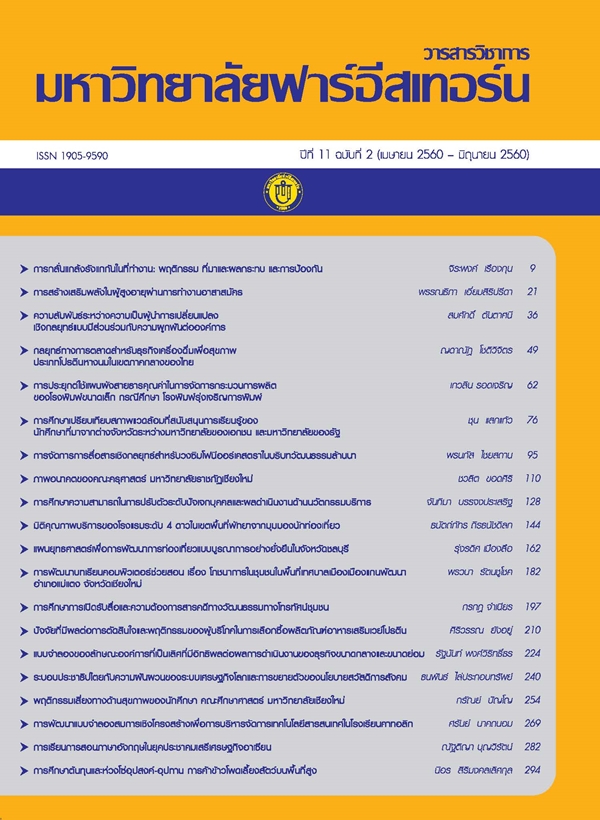ระบอบประชาธิปไตยกับความผันผวนของระบบเศรษฐกิจโลกและการขยายตัว ของนโยบายสวัสดิการสังคม: การทบทวนแนวคิดและกรณีศึกษาประเทศไทย
Main Article Content
Abstract
ระบอบการเมืองมีอิทธิพลต่อการกำหนดและดำเนินนโยบายสาธารณะของรัฐบาล นักรัฐศาสตร์และ
เศรษฐศาสตร์การเมืองให้ความสนใจในการอธิบายความสัมพันธ์ระหว่างระบอบการเมืองกับการกระจาย
ทรัพยากรสาธารณะในนโยบายสวัสดิการสังคม จากการปริทรรศน์ในแนวคิดทางรัฐศาสตร์และเศรษฐศาสตร์
รัฐบาลในระบอบการเมืองแบบประชาธิปไตยมีแนวโน้มที่จะจัดสรรงบประมาณและทรัพยากรค่อนข้างมาก
ในโครงการสวัสดิการสังคมมากกว่ารัฐบาลในระบอบการเมืองแบบเผด็จการ เหตุผลที่ทำให้รัฐบาล
ประชาธิปไตยจัดสรรงบประมาณและทรัพยากรบุคคลค่อนข้างมากเพราะกระบวนการทางการเมืองและ
แรงจูงใจทางการเมืองในระบอบประชาธิปไตย นอกจากนี้ ความผันผวนในระบบเศรษฐกิจระหว่างประเทศ
เป็นปัจจัยที่หนุนให้รัฐบาลในระบอบประชาธิปไตยจัดสรรงบประมาณและทรัพยากรให้โครงการสวัสดิการสังคม
อย่างไรก็ตามจากกรณีศึกษาประเทศไทย การศึกษาความสัมพันธ์ระหว่างระบอบประชาธิปไตยกับ
การกระจายทรัพยากรควรคำนึงถึงบทบาทขององค์กรปกครองส่วนท้องที่และท้องถิ่นซึ่งเป็นกลไกสำคัญ
ในการกระจายทรัพยากรสาธารณะไปยังประชาชนอย่างทั่วถึง
Political regime has an influence on the government’s public policy formation and
implementation. Political Scientists and political economists have paid attention in explaining the
relation of political regime and resource redistribution in social welfare policy. After reviewing political
and economic concepts, democratic governments are more likely to allocate budget and resources
to social welfare programs than authoritarian governments. The reason why the democratic governments
allocate budget and human resources is due the large part to the political processes and the
political incentives of democratic regime. In addition, fluctuation in international economy becomes
the factor encouraging the democratic governments to allocate budget and resources to social
welfare programs. However, according to a case study of Thailand, the studies of the relation
between political regime and resource distribution should recognize the role of local governments
which are significant mechanisms in redistributing resources to citizens equally.
Article Details
1. Any views and comments in the FEU Academic Review Journal are the authors’ views. The editorial staff have not to agree with those views and it is not considered as the editorial’s responsibility.
2. The responsibility of content and draft check of each article belongs to each author. In case, there is any lawsuit about copyright infringement. It is considered as the authors’ sole responsibility.
3. The article copyright belonging to the authors and the Far Eastern University are copyrighted legally. Republication must be received direct permission from the authors and the Far Eastern University in written form.
References
ภาษาไทย
คริส เบเคอร์ และ ผาสุก พงษ์ไพจิตร. (2557). ประวัติศาสตร์ไทยร่วมสมัย. พิมพ์ครั้งที่ 2. กรุงเทพมหานคร: สำนักพิมพ์มติชน.
ธนพันธ์ ไล่ประกอบทรัพย์. (2557). “ระบอบประชาธิปไตยกับผลต่อการกำหนดนโยบายสาธารณะ,” วารสารการเมือง การบริหารและกฎหมาย, 6(3), 283-300.
ธนพันธ์ ไล่ประกอบทรัพย์. (กำลังตีพิมพ์). เศรษฐกิจ การเมือง โครงสร้างของรัฐและการพัฒนานโยบายสาธารณะในมุมมองเปรียบเทียบ. กรุงเทพมหานคร: สำนักพิมพ์แห่งจุฬาลงกรณ์มหาวิทยาลัย
ธนพันธ์ ไล่ประกอบทรัพย์ วิชุดา สาธิตพร สุนิสา ช่อแก้ว. (2559). รายงานวิจัย: กระบวนการประชาธิปไตยและการสร้างความเป็นธรรมทางสังคม:บทเรียนของความไม่เท่าเทียมและความเหลื่อมล้ำในการเข้าถึงและได้รับประโยชน์จากโครงการสวัสดิการสังคมและโครงการการช่วยเหลือเกษตรกร. กรุงเทพมหานคร: สำนักวิจัยและพัฒนา สถาบันพระปกเกล้า.
ธนพันธ์ ไล่ประกอบทรัพย์ สุนิสา ช่อแก้ว สติธร ธนานิธิโชติ วิชุดา สาธิตพร. (2559). “ลักษณะการเข้าถึงโครงการช่วยเหลือประชาชนของรัฐบาล: ประสบการณ์ภาคสนามจากภาคเหนือและภาคใต้ของไทย.” บทความ
ภาษาอังกฤษ
Acemogul, D., & Robinson, J. (2002). “Reversal of fortune: Geography and institutions in the making of the modern world income distribution,” Quarterly Journal of Economics, 118, 1231-94.
Boix, C. (2003). Democracy and redistribution, New York, NY: Cambridge University Press.
Birkland, T. (2010). An introduction to policy process: Theories, concepts, and models of public policy making. United States: M.E. Sharpe.
Cameron, D. (1978) “The expansion of public economy: A comparative analysis,” American Political Science Review, 72(4), 1243-1261
Dahl, R. (1973). Polyarchy: Participation and opposition. New Haven, CT: Yale University Press.
Downs, A. (1957). An Economic Theory of Democracy. New York, NY: Harper and Row.
Dworkin, R. (2006). Is democracy possible here?: Principles for new political debate. Princeton, NJ: Princeton University Press.
Kennedy, D. (1999). Freedom from fear: The American people in depression and war, 1929-1945. New York, NY: Oxford University Press.
McGuire, J. (2010). Wealth, health, and democracy in East Asia and Latin America. New York, NY:
Cambridge University Press.
Meltzer, A. H., & Richards, S. F. (1981). “A rational theory of the size of government,” Journal of Political Economy, 89 (5), 914-927.
North, D. (1991). Institutions, institutional change and economic performance. New York, NY: Cambridge University Press.
Powell, G. Bingham. (2000). Elections as instruments of democracy: Majoritarian and proportional visions. New Haven, CT: Yale University Press.
Putnam, R. D. 1993. Making democracy work: Civic traditions in modern Italy. Princeton, NJ: Princeton University Press.
Sagarik, D. (2013). “An analysis of the determinants of education expenditures in Thailand,” Asian Politics
and Policy, 5(2), 227-248.
Skocpol, T. (1995). Social policy in the United States: Future possibilities in historical perspectives.
Princeton, NJ: Princeton University Press.
อินเตอร์เน็ต
ประชาชาติธุรกิจ เกาะกระแสโลก, (2559), “ผลประชามติชาวสวิส "คัดค้าน" ให้เงินเดือนปชช.ทุกคนเดือนละ 90,000บาท,” http://www.prachachat.net/news_detail.php?newsid=1465196347. สืบค้นเมื่อวันที่ 18 ตุลาคม 2559.
